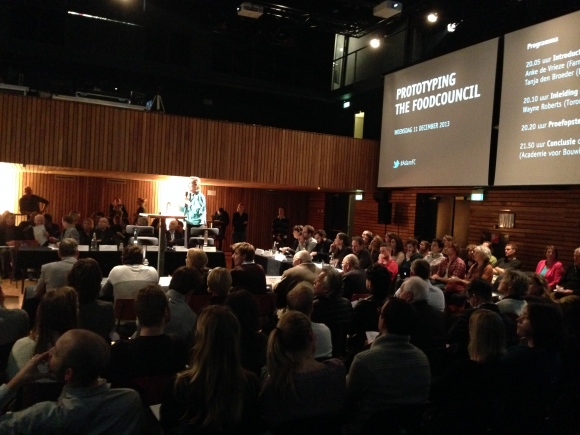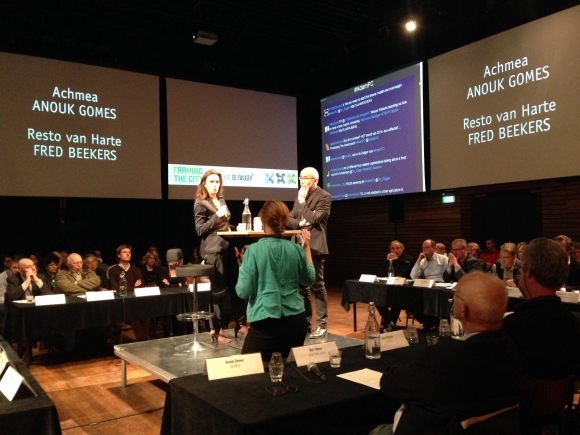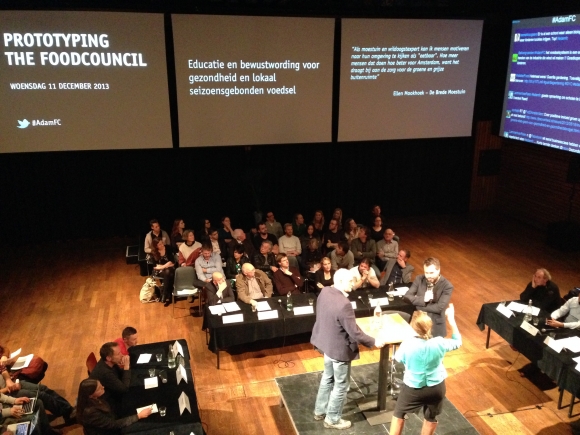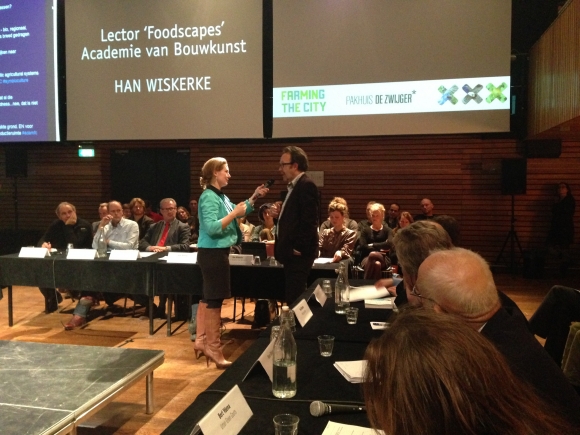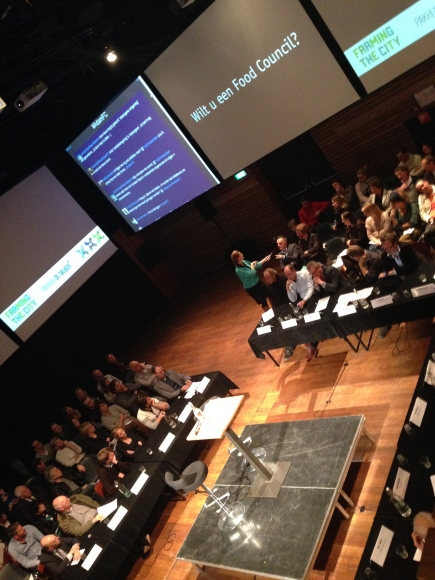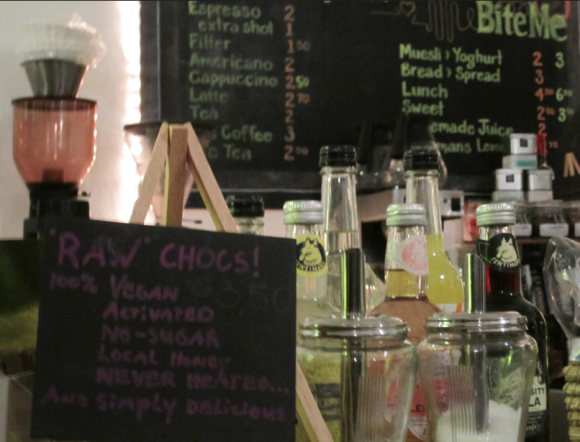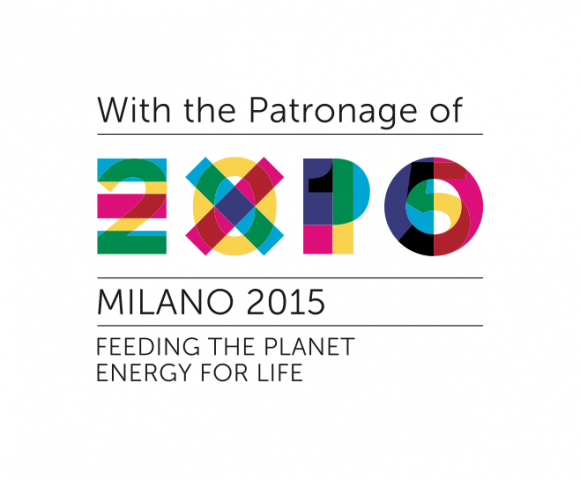
“A prototype is an early sample, model or release of a product built to test a concept or process or to act as a thing to be replicated or learned from […]Prototyping serves to provide specifications for a real, working system rather than a theoretical one”
-Wikipedia-
On December 11th, the stage was set in Pakhuis de Zwijger to “prototype” a food council for Amsterdam. Organized by FARMING THE CITY and Platform Eetbaar Amsterdam in collaboration with Pakhuis de Zwijger, the aim of the night was to explore how a food council could function by setting a working example. Being very common in industrial design, we adopted the concept of ‘prototyping’ as a new format for social innovation.
Twenty-five expert practitioners from different food related fields were invited to take part in this living experiment. Seated around a four-sided center stage, invited members and commentators comprised the first row, with audience members behind them–all together forming what can be called the ‘quadruple helix’–an extension of the traditional university-industry-government ‘triple helix’ that includes a fourth element: society.
Members:
Erik Fischer (Foodcenter), Samuel Levie (Foodcabinet),Cor-Jan Tolkamp (Foodcoop),Gaston Remmers (CAH Vilentum hogeschool Almere), Hanneke Noordam (Vrije Universiteit), Han Wiskerke (Wageningen Universiteit / Academie van Bouwkunst), Fred Beekers (Resto van Harte), Margot Alting (Amsterdamse Natuur en Milieu Educatie Centrum), absent due to illnes, Bert Ydema (Urban Green Courts), Piet IJzendoorn (Boerderij Zonnehoeve, Zeewolde), Ed Buijs (Dienst Ruimtelijke Ordening – gemeente Amsterdam), Susanne de Boer (Rabobank Amsterdam), Hans Ghijsels (LTO Noord), Jair Schalkwijk (DoeTank), Debra Solomon (Urbania Hoeve), Anouk Gomes (ACHMEA),Drees Peter van den Bosch (Willem & Drees), Joost Cornelis (Van Boer tot Bord), Jonathan Karpathios (Restaurant Vork en Mes, Haarlememrmeer), Ed Nobel (INCOTEC group, Seed Valley), Ellen Mookhoek (De Brede Moestuin), Henk Renting (RUAF Foundation), Jan Westra (Priva, Westland) Peter Poelstra (De Kweker).
Food Councils can be found in several cities in North America and the UK, while also recently introduced closer by in Rotterdam. In Amsterdam, food has been high on the agenda in recent years and today the city is bustling with food related initiatives while the municipality writes a new Food Vision. Given these circumstances, a central question motivated the evening: could a Food Council prove valuable for Amsterdam?
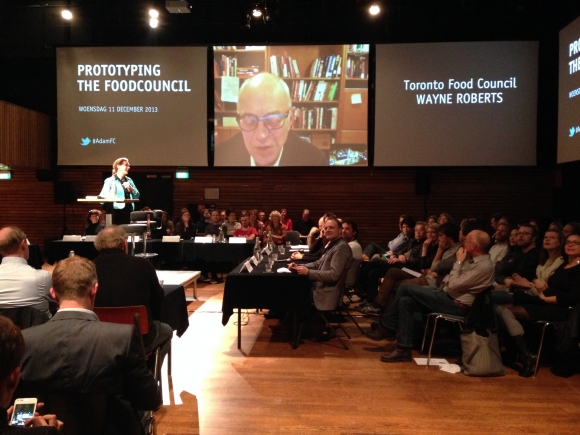
To learn more about what a Food Council actually is, does, and what it can achieve, the night was opened by a live, video Skype call with Mr. Wayne Roberts, founder of the Toronto Food Policy Council, one of the first food councils in the world. Wayne explained:
- “The overall goal of the food council is to bring together everybody that is involved with food, from every walk of life, and discuss what is important”.
- This is necessary because food is like a Rubik’s cube: you cannot solve the puzzle by looking only at one side. Every side needs to work together to get to a solution. And this is exactly what a food council can do.
- Moreover, (by providing an integral vision) a food council can help a local government implement its food policy. According to Wayne, a food council is therefore not a cost for a city, but revenue.
- One concrete example of what the TFPC has achieved is to reduce crime rates in a gang-ridden neighborhood by implementing community gardens.
- The TFPC meets several times a year, but Wayne points out that the most important things happen in-between meetings. The food council functions as an incubator – accelerating change by making the right connections.
After the introduction from Toronto, it was time to start our own, local food council meeting. Under the professional guidance of moderator Natasja van den Berg, the Food Council was invited to discuss three preselected themes. Each theme was based on prior input given by the food practitioner council members, introduced by two select practitioners, and discussed in three rounds of about half an hour each.
Discussion one: obesity
The first theme discussed was obesity, emphasizing children and low-income communities. Today, in Amsterdam one in four kids is overweight, and in the lowest income areas of the city, only a troubling 2% of the kids are getting a proper amount of fruits and vegetables.
This segment was opened by Anouk Gomes from Achmea, one the leading Dutch health insurance agencies, and Fred Beekers from Resto van Harte, a volunteer based organization that brings people together through food. While obesity is a complex problem that should be addressed at different levels, everyone at the Food Council agreed that education is vital. The problem should be addressed in schools, hospitals and by GP’s. Particularly in schools, it is important to start educating children from a very early age. To facilitate learning at home, both children and parents should be taught about good and healthy food, how to prepare it, where to get it and that it does not have to be the more expensive option, as parent’s practices are often highly influential on adolescent learning and behavior. Along these lines of thinking, children should also learn to listen to their own bodies and not to give in to, for example, junk food and fast-food options. It was agreed by everybody that teaching children (and their parents) about food in a fun and accessible manner is most effective.
Discussion two: raising education and awareness: health and local seasonal food
The second discussion built on concerns regarding obesity, focusing on raising education and awareness regarding health and local seasonal food. Once again, the discussion was opened by two members of the Food Council: Samuel Levie, founder of the Youth Food Movement and entrepreneur at Food Cabinet and Brandt & Levie. and Bert Ydema, who was a teacher at the school gardens for 40 years before founding the company Urban Green Courts. Several issues were brought to the table:
- The importance of starting from a really young age.
- The need for children to experience a whole growing season, rather than a one time visit to farms.
- The need for cooperation between different parties and to make food education part of the school curriculum. ANMEC is currently working on this in partnership with others.
- The importance of the social aspect of food and agriculture, as people are often addressed to individually change their behavior, while it’s well known that behavior is socially informed. Therefore addressing the social setting is very important in behavioral change.
- Educational programs can have a supporting role from the food industry, but should never be ‘owned’ by private companies.
The discussion shared a concern in the importance if awakening curiosity within children, and that it is crucial to catalyze such curiosity at a very early age by teaching not only about food itself, but also how it is produced, about agriculture, and by expelling fears of (different) foods. Many children and parents can learn more on how to cook and prepare meals, and hopefully even to grow food. Perhaps even better, to have people growing food together and make it a social happening–where people get their hands dirty and make themselves proud collectively.
Local Food Chains: a logistical and commercial challenge
Discussion three: local food chains and their logistical and commercial challenges
The last round of discussion focused on local food chains, opened by Erik Fischer, chairman of the Verenigde Bedrijven at the Food Center Amsterdam and Piet Ijzendoorn, owner of De Zonnehoeve, one of the oldest bio-dynamic farms in the Netherlands.
With around 8 farmers a day giving up their business in the Netherlands, today’s situation is upsetting. What we should be working towards, according to Piet Ijzendoorn, is a future where the Netherlands can produce enough food for all inhabitants and still be able to exchange products on the international market (currently the Netherlands is the 2nd largest export country in the world); we should not become dependent on our food supply from agro-food industry. With the food council in agreement, Erik Fischer addressed the need to bundle local food streams and the possibility of using the Food Center for this ambition. The main issues brought to table were:
- The possible need of more food hubs (like FCA) in Amsterdam
- The need of a hood hub like the FCA in Almere
After the third round, the evening was wrapped up by prof. Han Wiskerke, a ‘Foodscapes’ lecturer at the Academy of Architecture in Amsterdam. He was positive about the night, only wishing there was more time to examine the many complex and interesting issues in greater depth.
In light of the night’s successful discussions, prototyping a Food Council was not a futile idea. We learnt that different actors and initiatives, despite representing different interests and perspectives, tend to agree on the importance of creating a place (physical or conceptual) to connect and share proposals for an overall vision that has the potential to benefit the city, its wealth and most importantly, the quality of life.
As organisers, co-curators, devisors, and co-producers, we have been analyzing the process of creating a new model of consultation, and we are willing to bring this idea forward many steps. Our ambition is to advocate for the creation of a real food council, which would set a general direction for the local actors involved in the food field. In order to do this, the process has to gain more momentum: we need to involve bigger companies, bigger institutions and bigger actors, while incorporating the influential fourth leg of the ‘quadruple helix’–citizen actors. We are not competing with the existing system, we are just addressing necessary problems of today’s human condition in hopes of providing the opportunity to set new standards.
Many thanks to all the participants – members, commentators and audience – for their willingness and commitment to contribute to this experiment!
*Keep track of the development of the Amsterdam Food Council on twitter #AdamFC
]]>Why would we do that? Through research at CITIES and Farming the City, we know a growing wealth of knowledgeable citizens working from the bottom up are increasingly instrumental actors in shaping the local food landscape. However, the standard institutional model for developing public agendas and policies is the triple helix – seeing the best route to innovative development through public and knowledge institutions collaborating with corporate business. This model excludes the small-scale grassroots initiatives from the development phase. As this growing citizenry shapes the foundation of a modern food movement, we believe that citizens are the secret ingredient to a truly innovative, functional new Food Agenda in Amsterdam.
With this logic, we developed an inclusive approach that brings citizens into the triple helix framework. On December 11th at Pakhuis de Zwijger, together with Farming the City and Eetbar Amsterdam, we will Prototype a Food Council under this framework.
What To Expect
First, we had to organize the Food Council. To do so, we asked representatives from private, public, social, grassroots, knowledge, environmental and health sectors active in Amsterdam’s ‘food field’ to each answer questions about their motivations, values, priorities and plans for envisioning the future of food in Amsterdam. The answers these initial 25 participants provide are being analyzed and organized to generate a set of infographics used to kick-off the public discussion and debate concerning the role, ambitions and trajectories that Amsterdam’s ‘food field’ could take. (For more info, check the analysis of Amsterdam Food System made two years ago here)
Wayne Roberts, founder of the Toronto Food Policy Council, will open the evening via Skype. Following, one primary roundtable of 25 people will address three main themes, each lasting around 15 minutes. During this discussion, willing participants will be asked up to a small podium to present an issue being discussed from their perspective. Participants are encouraged to confront the representatives, when felt necessary, as this generates discussion and debate that establishes the strongest conclusions.
After the three themes are discussed, Han Wiskerke, Professor of Rural Sociology from Wageningen, will provide a brief, critical overview of the evening, summing up the most important issues developed during the conversations. Han will also evaluate the work of the organizing partners, offering constructive criticism for them to strengthen their future work.
The overall ambition is to discover what the potential directions are for Amsterdam’s ‘food field’, with hopes of securing commitment for future actions.
Come and join us in this experimental food adventure, the event is free, but there are not more than 200 places left.
Event Details and Registration
The program is a co-production between Farming the City, Eetbar Amsterdam and Pakhuis de Zwijger.
Admission is free. We ask you to please reserve your space. To do so, click the red “Reserveer” button at the top of this sign-up page (click here). The sign up link directs you to Pakhuis de Zwijger’s event page, where you will also find additional information.
Location: Pakhuis de Zwijger
Time: 20:00
Language: Dutch
Cost: Free
Sign up (click red “Reserveer” button at top of sign up page)
Featuring:
Wayne Roberts (Toronto Food Policy Council) (via Skype)
Erik Fischer (Foodcenter)
Samuel Levie (Foodcabinet)
Cor-Jan Tolkamp (Foodcoop)
Gaston Remmers (Agrarische Hogeschool Almere)
Hanneke Noordam (Vrije Universiteit)
Han Wiskerke (Wageningen Universiteit / Academie van Bouwkunst)
Fred Beekers (Resto van Harte)
Margot Alting (Amsterdamse Natuur en Milieu Educatie Centrum)
Bert Ydema (Urban Green Courts)
Piet IJzendoorn (Boerderij Zonnehoeve)
Ed Buijs (Dienst Ruimtelijke Ordening – gemeente Amsterdam)
Doortje van Unen (Amsterdam Economic Board)
Anne Stijkel (Wij Krijgen Kippen!)
Susanne de Boer (Rabobank Amsterdam)
Kees Diepeveen (wethouder Stadsdeel Noord)
Drees Peter van den Bosch (Willem & Drees)
Join the Old Amsterdam Food Tour for a guided walking tour through the historical city centre to learn answers to these historical questions, while experiencing the present urban landscape and lifestyle alongside sites and tales of how the past has changed, evolved and adapted to our modern food system. Along the way, you will also be treated with delightful tastings of food and drink.
We have two options featured below: Private and group tours.
Exclusive Holiday Private Tours for Two
In the holiday spirit, we thought it would be nice to offer private tours for two. For friends, loved ones or family, private one-hour walking tours will offer a fun, romantic, education, and tasty time in the historic centre of Amsterdam.
Including food and drink tastings, private tours for two are offered at a rate of €50. Additionally, we offer e-tickets that can be bought as presents for others, and we will schedule your private tour at a date and time of your convenience.
Holiday Private Tour Details:
- Private tours for two
- One-hour, on foot
- Date and time of your convenience
- €50, including food and drink tastings
- Available as e-ticket, printable gifts
- Extending into January
Holiday Group Tours
Experience the tastes and transformations of Amsterdam as group this holiday season – with friends, colleagues and/or family. Here is the scoop:
- Two-hour walking tour
- Groups of 8 – 15 people (pre-formed groups only)
- Date and time of your convenience
- €30 per person, including food and drink tastings
- Extending into January
HOW TO BOOK A TOUR
We love these tours, and think you will, too. If interested, please contact foodtour(at)farmingthecity.net for more information or to register.
Happy holidays.
]]>As group-based workshops, everyone experiences the learning process together – exchanging knowledge, sharing experience, and generating life-lasting DIY skills to put to use and share with others. On top of that, you get some delectable edibles.
Both workshops (details below) are great for any interested group – from friends, to family, students or colleagues wanting to design an urban office garden together and share in the knowledge, process and tasty edibles available to spice up lunch.
Mushroom Workshop
Learn how to grow your own edible in this two-hour workshop teaching you everything you need to know about growing your own supply of oyster mushrooms using re-purposed coffee grounds. After the workshop, your first batch is started and the skills, knowledge and materials are yours. For pre-formed groups of 8 – 15 people, workshops are hosted at a location of your choice for €30 per person, including materials.
Edible Landscape Workshop
This two-hour workshop will teach you how to design an indoor urban garden landscape, where you can grow all sorts of edibles, such as ricola, basil and tomatoes. While skills, knowledge and know-how is increased through a process of group-based learning, it might be fun to continue sharing what you learned with your group after the workshop, combining efforts to sustain an edible urban landscape together. But how you use what you learn and grow is completely up to you. For pre-formed groups of 8 – 15 people, workshops are hosted at a location of your choice for €30 per person, including materials.
DETAILS FOR BOTH WORKSHOPS
- Groups of 8 – 15 people (pre-formed)
- Workshop hosted at location of your choice
- At date and time of group’s convenience
- €30 per person, including materials
For more information and registration, please contact anke(at)farmingthecity.net.
]]>Our next Food Mash will take place in January and will be hosted by Moes. Please sign up individually through this sign-up form so we have an accurate picture of who’s coming. Dinner will be 5 EUR (salad and soup), and drinks will be between 1.50 an 2 EUR.
Friday, January 20th, 2014
18:00 – 21:30
If you’re a processor or local brand, please contact Chris at Metabolic ([email protected]) if you’d like to showcase / sample some of your products.
Hope to see you in January!
]]>
FOOD MASH KICKS OFF
Food Mash premiered on November 11th at the OpenCoop, where participants enjoyed fresh local eats prepared by BiteMe as they settled in. Once everyone was seated, Chris from Metabolic introduced the agenda. This first Food Mash focused on: farmers, producers and growers, but also on making connections.
Organized in a casual ‘living room style,’ the floor was given to participants for a round of one-liner introductions, illuminating the wealth of knowledge and ambition within a packed-house. From biodynamic farmers to solo pizza-preneurs, chefs, restaurants owners, students, logistical workers, food policy councilors, environmental organizations and municipal workers, a diverse group shared interrelated interests and activities under shared goals. Raising issues from producing and utilizing new technologies to addressing scale and logistics, increasing awareness, and unwrapping current infrastructure to elevate a more locally-functioning type of ‘good food movement,’ the first Food Mash was set in motion.
HEARING FROM FARMERS, GROWERS AND PRODUCERS
First-hand insight into what farmers, producers and growers are actually doing generated greater awareness and opportunities. One farmer shared the experience of over 30 years of ‘honest’ farming, with dedication to natural and regenerative cycles. Starting with an emphasis on soil health, plants, animals and consumers then benefit from increased nutrients, while sustaining the fertility and health of the land for future generations.
Here we see a divide between industrial and local farms, between productivity and efficiency and quality and sustainability. While local farmers’ bottom line is maintaining quality and sustainable practices, in order to simultaneously boost output, farmers need greater resources and capital, which results from greater access to markets with a strong consumer base.
One challenge raised is revising cultural beliefs and practices around food. Media have been influential in shaping the current food culture and is influenced by big business. This leads to people expecting food to be on the shelves, cheap and relatively uniform in size, shape and color – despite the fact it is unhealthy for the environment, soil and consumption. What gets lost in communication is the real value of food. Prices are low because governments subsidize big agriculture. Local farmers don’t want government subsidies; they hope the real economic value of food, health and sustainability will become common knowledge of society.
Despite challenges, farmers don’t want to focus on problems, but on finding possibilities and actively sharing and working on them to influence a wider population. Through this process, further issues of logistics, scale and communication will be better equipped to find solutions.
Taking inspiration from the farmer’s stories, the group broke into four subgroups to further explore solutions and make connections before closing the evening with more drinks, snacks and conversation.
See you at the next Food Mash -Find out more here!
]]>
Last year we launched the Old Amsterdam Food Tour, where an enthusiastic guide takes participants on a two hour tour through Amsterdam’s historic centre, showing them all the known, and more importantly, unknown historic food locations. Have you ever realized where the name of the city’s most important shopping street – the Kalverstraat – originated? And did you know what happened at the current central station before trains arrived there? Participate in the Old Amsterdam Food Tour and you will learn all about it.
In 2015, Milan (Italy) will host the universal exposition; EXPO 2015 ‘Feeding the Planet. Energy for Life’. An event that will make the citizens and visitors aware of the importance of food, agriculture and water in their daily lives. Slowly the city is transforming from the capital of fashion and design into the centre of food and agriculture. Not a strange event as you realize that it is located in the highest producing province of the country.
After the success of the Old Amsterdam Food Tour and in view of the upcoming EXPO2015, Farming the City committed the Dutch Food in the Streets to execute research on the relation between urban development and food systems in Milan. A first investigation has exposed interesting facts which definitely garner further research: the food market at the doorstep of a now luxurious hotel, milk delivery from door to door and the cereals growing right in front of the famous Duomo cathedral.
The research will be take place during the winter months and will be finished by the end of March. So if you plan to visit Milan next spring, don’t forget to book a visit with the Old Milano Food Tour. Follow Farming the City and Food in the Streets to stay updated.
There is still a need for some sponsors to be able to pay the researchers. Contact Farming the City ([email protected]) when you are interested to contribute. In exchange of a contribution, we offer you publicity and a free tour for two persons of your company.
]]>Amsterdam Economic Board and other local public institutions base the development of public agendas and policies on what is known as triple helix. The triple helix is a model to bring together Corporate Businesses, Public Offices and Knowledge Institutions. Together those three “representatives of the innovative side of things” are considered to be able to define trajectories for future urban developments. But the question might be: where are the people?
When approaching such a popular issue, as food rightfully is, it is difficult to exclude the citizens from the picture. Thanks to the research and the work conducted within the framework of FARMING THE CITY, we realized that in Amsterdam (as in many other cities in the global north) there is a growing population of innovative, small-scale food experimentalists. The tacit knowledge developed in this emerging food field is, in our opinion, of immense value. As a consequence, in the case of developing a new food agenda, excluding the civil society from the development phase might result in having a non-updated, and especially non-inclusive Agenda about the future of food in Amsterdam. How to continue?
Without formal public support, but with an embarrassing informal commitment, we decided to take the model of the triple helix and include the civil society, or the representatives of the bottom-up food revolution. On December 11th, at Pakhuis de Zwijger, we will position public and research representatives, corporate representatives and civil society in front of each other answering this question:
“If you would be part of the Amsterdam Food Council, which values would you bring to the table? What would your priority be?”
Before the debate, Wayne Roberts will virtually explain what a food council is.
For the time being, save the date, soon there will be a page available on the website of Pakhuis de Zwijger with all the info you need to participate in the debate about the future of food in Amsterdam.
]]>Amsterdam Economic Board and other local public institutions base the development of public agendas and policies on what is known as triple helix. The triple helix is a model to bring together Corporate Businesses, Public Offices and Knowledge Institutions. Together those three “representatives of the innovative side of things” are considered to be able to define trajectories for future urban developments. But the question might be: where are the people?
When approaching such a popular issue, as food rightfully is, it is difficult to exclude the citizens from the picture. Thanks to the research and the work conducted within the framework of FARMING THE CITY, we realized that in Amsterdam (as in many other cities in the global north) there is a growing population of innovative, small-scale food experimentalists. The tacit knowledge developed in this emerging food field is, in our opinion, of immense value. As a consequence, in the case of developing a new food agenda, excluding the civil society from the development phase might result in having a non-updated, and especially non-inclusive Agenda about the future of food in Amsterdam. How to continue?
Without formal public support, but with an embarrassing informal commitment, we decided to take the model of the triple helix and include the civil society, or the representatives of the bottom-up food revolution. On December 11th, at Pakhuis de Zwijger, we will position public and research representatives, corporate representatives and civil society in front of each other answering this question:
“If you would be part of the Amsterdam Food Council, which values would you bring to the table? What would your priority be?”
Before the debate, Wayne Roberts will virtually explain what a food council is.
For the time being, save the date, soon there will be a page available on the website of Pakhuis de Zwijger with all the info you need to participate in the debate about the future of food in Amsterdam.
]]>